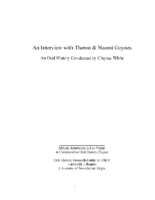Search the Special Collections and Archives Portal
Search Results

Transcript of interview with Ray Christian by Russell L. Ellis, March 19, 1978
Date
Archival Collection
Description
On March 19, 1978, Russell L. Ellis interviewed former postal worker, Ray Christian (born 1927 in Las Vegas, Nevada). The two discuss Ray’s family history and his experiences as a Black man in early Las Vegas. Ray Christian compares the experiences of his childhood with that of his children in Las Vegas. The interview concludes with Christian expressing how Las Vegas has grown and that there are more opportunities available for his children to pursue.
Text

Transcript of interview with Willie Jones, James Jones, and Jamet Jones by Robbin Mc Laurin, March 5, 1980
Date
Archival Collection
Description
On March 5, 1980, collector Robbin McLaurin interviews three members of the Jones family, Willie, James, and Jamet Jones (born 1923, 1920, and 1961, respectively) in the Jones home. Mr. and Mrs. Jones were born in Forest, Mississippi, and relocated to Las Vegas, Nevada, for employment related purposes. This interview covers Las Vegas, past and present.
Text

Transcript of interview with Billy Paul Smith by Claytee White, October 3, 2013
Date
Archival Collection
Description
Chemist, mathematician, and health physicist Billy Paul Smith donates time to tutor young people in hopes of attracting more youth into the fields of math and science. Born in 1942 and schooled in segregated black schools in Shreveport, Louisiana, and Texarkana, Texas, he graduated from high school at age fifteen and enrolled at Prairie View A&M University, where he trained with the Reserve Officer Training Corps (ROTC) and earned his Bachelor’s degree in chemistry and in 1964 his Master’s degrees in chemistry and math. Most young U.S. Army officers in 1964 went to Vietnam, but Billy’s math and science background steered him to the Army Chemical Corps, where he was quickly selected to join a new team. The team was to develop responses to nuclear weapon accidents and worked under the Defense Atomic Support Agency (DASA) in Albuquerque, New Mexico. At the same time, Billy completed the Weapons Ordinance Army course on classified information relating to the U.S. nuclear weapons arsenal. In this interview, Billy talks about his service with DASA and his subsequent twenty-seven years working at the Nevada Test Site in a variety of positions with Reynolds Electrical and Engineering Company, Inc. (REECo), a company that had “percentagewise more blacks in management positions than any other [Las Vegas] company.” He experienced the quiet racism of Las Vegas residential segregation when he tried to purchase a house in a neighborhood he liked and the unexpected kindness of the REECo general manager, Ron Keen, who made sure the Smith family could live where they wanted to live. He talks about Area 51 and explains underground testing activity and offers the scientific and ecological reasons why scientists deemed Yucca Mountain safe to store nuclear waste. After retiring at fifty-two, Billy and a colleague formed an independent instrumentation company, which, from 1995–2005 provided and calibrated radiological measurement and detection instruments for the decommissioning and closure of the Rocky Flats nuclear plant in Golden, Colorado. During that time, Billy rented an apartment in Boulder, but he and Jackie maintained their Las Vegas home, where they still reside. Billy shares memories of places he and his wife used to enjoy on the Westside and tells of their longtime friends in the black community. He also talks about developing his philosophy of philanthropy through Alpha Phi Alpha Fraternity and discusses becoming a member of the Knowledge Fund Advisory Council for the Governor’s Office of Economic Development (GOED) and the advisory council for the Nevada System of Higher Education.
Text
Clinton Wright oral history interview: audio clip
Date
Archival Collection
Description
Clinton Wright discusses the riots in the predominantly Black Westside neighborhood in Las Vegas in 1992 after the Rodney King verdict. Wright describes how the riots lasted three to four days, and he thought they were instigated by people who came from California and Los Angeles. He said that the shopping center in the Westside burned, there were firebombs, and white drivers were attacked and beaten up while the police did little to control it. Wright was known as a photographer and a newspaper offered him $50 per hour to take pictures of the riots. After some consideration, her turned this offer down because he believed it would be dangerous for him with a camera.
Sound

Transcript of interview with Gwen Walker by Claytee White, July 15, 2014
Date
Archival Collection
Description
Gwendolyn K. Walker arrived in North Las Vegas in 1962 from Houston, Texas, as a five-year-old with her parents, two brothers, and her cousins. The Walker family at first moved to a rented house on D Street, and Gwen attended Kit Carson Elementary School for first grade. Her mother enrolled in nursing school, so she sent Gwen back to Delhi, Louisiana, to be raised by her grandmother. In Delhi Gwen picked cotton with her aunt while she was in the second grade. Gwen returned to North Las Vegas to live with her mother and complete elementary school at Jo Mackey before matriculating to J. D. Smith Elementary School for junior high school and then to Clark High School. Later she attended UNLV. Gwen and her mother joined Saint James Catholic Church at H Street and Washington Avenue, but after she returned from Delhi she joined Second Baptist Church, where she became close with a cohort of friends that remained strong even as she experienced racism and bullying and love for the first time.
Text
Jimmy Gay oral history interview: audio clip
Date
Archival Collection
Description
Jimmy Gay discusses racism in Las Vegas before and after World War II. He says that prior to WWII, there wasn't a lot of prejudice, and there were only a few African American families. After WWII, he says that the influx of soldiers returning and the migration of Black families from the South led to Las Vegas becoming the "Mississippi of the West."
Sound

Transcript of interview with Vincent Kethen by Claytee White, December 23, 2009
Date
Archival Collection
Description
In 1964, the year that Vincent Kethen was born, desegregation of Las Vegas schools began. Like many African-American children living in the Las Vegas Westside neighborhood, Vincent was bused out of his neighborhood in third grade to attend a white school. In his case, this meant attending John S. Park Elementary and later other predominantly white schools. He talks about these experiences. John S. Park was a neighborhood of manicured lawns, while the school bus and the classroom were places fraught with fisticuffs. The experience of growing up during that era are recalled. Vincent provides a sense of that it was like to reside in his home neighborhood and the onslaught of the drug culture altered gang-lead neighborhoods. Being bused had positive results he explains, such as athletics, which served as an equalizer. For Vincent, a solid upbringing, which included love of church and the chance to attend college, encouraged him to make good decisions about his future. He received a four-year degree and he returned to Las Vegas to "give back." For over a decade and a half, her has coached young basketball players and helped them see their options for a brighter future than they might otherwise have seen.
Text

Magdalena Martinez oral history interview: transcript
Date
Archival Collection
Description
Oral history interview with Magdalena Martinez conducted by Monserrath Hernandez and Barbara Tabach on April 4, 2019 for the Latinx Voices of Southern Nevada Oral History Project. In this interview, Magdalena Martinez recalls her childhood and growing up in Los Angeles, California. Martinez's parents are from Durango, Mexico, and immigrated to the United States in the 1970s. Martinez describes the generational differences that the women in her family faced and how the feminist movement of the 1970s did not resonate with women of color. Her family moved to Las Vegas in 1986 where she attended Bishop Gorman High School. After transferring to the University of Nevada, Las Vegas (UNLV) from community college and joining a student organization that would later become Student Organization of Latinxs, she became an early member of the Latino Youth Leadership Conference (LYLC) sponsored by the Latin Chamber of Commerce. Martinez describes how the LYLC has evolved over the years, and talks about her role in those changes. She discusses past work for CSN, NSHE, and currently is the Director of Education Programs with the Lincy Institute.
Text

Transcript of an interview with Theron and Naomi Goynes by Claytee D. White, June 28 and July 12, 2012
Date
Archival Collection
Description
Interview with Theron and Naomi Goynes conducted by Claytee D. White on June 28 and July 12, 2012. A retired school principal, Theron Goynes also served as a North Las Vegas councilman and mayor pro-temp and was the first black in Nevada history to chair a government body. Naomi had thirty-six-year career in local education.
Text
Audio recording clips of interview with Theron and Naomi Goynes by Claytee D. White, June 28, 2012, and July 12, 2012
Date
Archival Collection
Description
Two audio clips from an interview with Theron and Naomi Goynes by Claytee D. White on June 28 and July 12, 2012. In the clips, Theron and Naomi remember their early years in the Las Vegas schools and the advent of desegregation.
Sound
